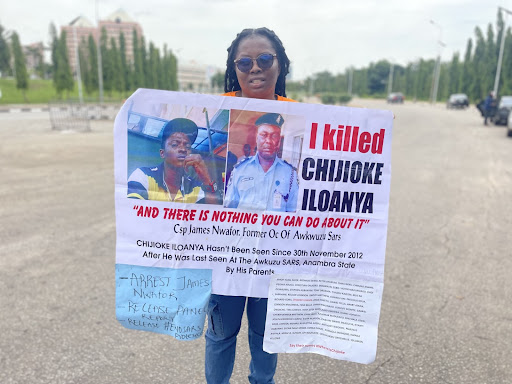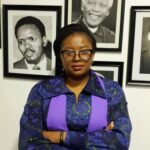From #EndSARS to Now: A Journey for Justice and Accountability
By: Obianuju Iloanya

When I first tweeted about my brother’s situation in 2019, it was out of hopelessness; I was sad and hurting and needed an outlet. When I called James Nwafor out in 2020 on X (formally known as Twitter), it was out of anger; I didn’t think that a man who had been a horrible police officer had any moral right to advertise the call for applications into the police force.
But it was hope that spurred me as I marched with other young people in Abuja under the scorching sun and in spite of the violence of the Nigerian police. Hope that justice will be served, that something will change, and that Chijioke will return to us.
When the massacre happened on 20/10/2020, I was devastated. What I felt at the time was indescribable. I felt like a fraud, because why should I be alive while others died while raising banners bearing my brother’s name and chanting the national anthem? It was a horrific night and the start of the death of my fledgling hope.
We were asked to attend the panels of inquiry in our respective states, which we did. I went to Anambra, and after weeks of waiting, it was our turn to be heard. Unlike in so many other cases where the police denied knowledge of the victims, the police legal representative, Innocent Obi, agreed that my brother was arrested by SARS in November 2012, but claimed that in January 2013, he confessed to being an armed robber and led the police to their hideout, where his colleagues opened fire on the police and he was caught in the crossfire. He was taken to the Nnamdi Azikiwe Teaching Hospital and pronounced dead.
This story was so painful and put a deep dent in my hopes of ever seeing my brother again. Truthfully, I do not believe this story as the police legal representative had earlier propositioned me for sex in exchange for agreeing that they have the file on my brother’s case. But that notwithstanding, these questions linger: Why did James Nwafor tell my parents that he had killed my brother and there was nothing they could do in December 2012? Why weren’t my parents allowed to see my brother in the station after his arrest in November 2012? Why wasn’t he charged in court as the law required? Why was he held in custody and tortured until January 2013? Why did no state or national dailies report a police shootout with armed robbers in January 2013? What happened to his body, and why weren’t we given his body to bury? Where is James Nwafor?
The Anambra panel ended their sittings and recommendations in 2021, and until now, October 2023, these recommendations haven’t been made public.
In January 2023, a friend reached out to me to say that her brother had been arrested and taken to Awkuzu SARS, where he died a day before being released to her parents. My friend’s brother, James Okafor, was my junior in primary school, and his death was one too many, but there was nothing that could be done to bring him back. But when I learned that the police had confiscated his body yet again, as in my brother’s case, I initiated a media campaign demanding that the police return his remains to his family, which they eventually did.
After this experience, I knew it was necessary to remind the government of the injustices we have faced and are still facing, but what power do I have? How can I draw attention to our predicament? How can a poor Nigerian girl from an obscure family get the government to take notice of her plight?
In July 2023, I decided to stage a ten-day, one-person protest. July, because it was Chijioke’s birth month; ten days because I began on the 3rd and finished on the 13th, his birthday. My protest wasn’t about gaining power or just making a statement; it was about drawing attention to the injustice that my family and others like us have experienced.
During the protest, I wrote to various offices requesting action on our behalf; I wrote to my National Assembly representatives, Prof. Oby Orogbu and Senator Victor Umeh; the National Security Advisor; the Inspector General of Police; the Director of the Department of State Security Services, and the Anambra State government through its liaison office in Abuja. So far, I have gotten no feedback.
Every day that passes makes it difficult to hope or think that we will get justice, but I can’t afford to give up now. I stood under the sun and rain in Abuja for ten days, not just because of Chijioke, my brother, but also for Ifeoma Abugu, Tina Ezekwe, Richard Gora and Okwuchukwu Onyemelue. It is for so many countless Nigerians who do not have a platform to speak out, whom justice has eluded just like me because we lack financial and social capital.
For justice to prevail, we demand a thorough investigation and prosecution of officers like James Nwafor, who have committed extrajudicial murders. The Anambra State Government must make the panel report and White Paper public. Actual police reform is impossible without justice for victims and survivors. My hope might have wavered in this journey but it has notdied. I fight because I believe in a better, more just Nigeria. Until justice prevails, my resolve remains unbroken, and the fight continues.

– Obianuju Iloanya is an advocate for social justice and gender rights activist. Her commitment to justice was ignited by the tragic loss of her brother, Chijioke Iloanya, in 2013.
